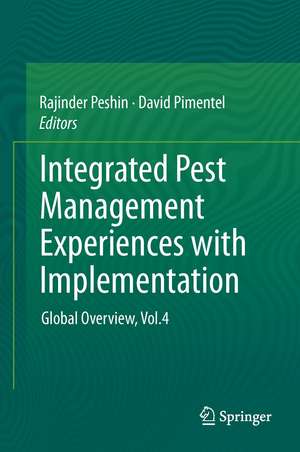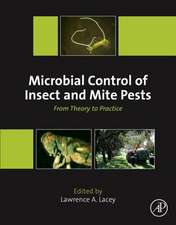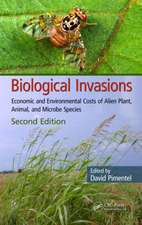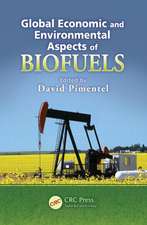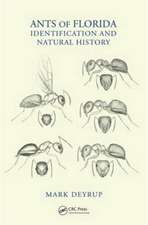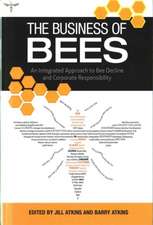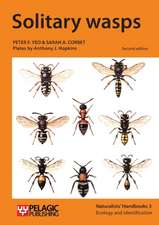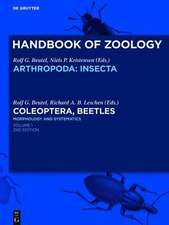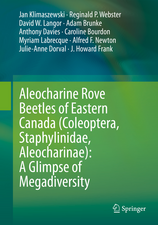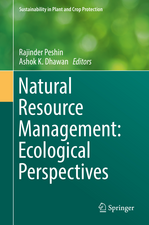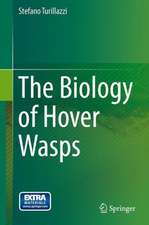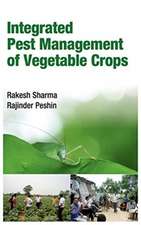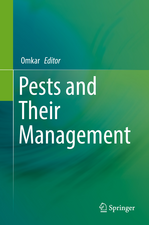Integrated Pest Management: Experiences with Implementation, Global Overview, Vol.4
Editat de Rajinder Peshin, David Pimentelen Limba Engleză Hardback – 3 iul 2014
| Toate formatele și edițiile | Preț | Express |
|---|---|---|
| Paperback (2) | 1063.78 lei 38-44 zile | |
| SPRINGER NETHERLANDS – 27 sep 2016 | 1063.78 lei 38-44 zile | |
| SPRINGER NETHERLANDS – 27 sep 2016 | 1226.24 lei 6-8 săpt. | |
| Hardback (2) | 1238.56 lei 6-8 săpt. | |
| SPRINGER NETHERLANDS – 30 apr 2014 | 1238.56 lei 6-8 săpt. | |
| SPRINGER NETHERLANDS – 3 iul 2014 | 1238.86 lei 6-8 săpt. |
Preț: 1238.86 lei
Preț vechi: 1510.81 lei
-18% Nou
Puncte Express: 1858
Preț estimativ în valută:
237.09€ • 246.61$ • 195.73£
237.09€ • 246.61$ • 195.73£
Carte tipărită la comandă
Livrare economică 14-28 aprilie
Preluare comenzi: 021 569.72.76
Specificații
ISBN-13: 9789400778016
ISBN-10: 9400778015
Pagini: 574
Ilustrații: LVI, 574 p. 89 illus., 55 illus. in color.
Dimensiuni: 155 x 235 x 30 mm
Greutate: 1.05 kg
Ediția:2014
Editura: SPRINGER NETHERLANDS
Colecția Springer
Locul publicării:Dordrecht, Netherlands
ISBN-10: 9400778015
Pagini: 574
Ilustrații: LVI, 574 p. 89 illus., 55 illus. in color.
Dimensiuni: 155 x 235 x 30 mm
Greutate: 1.05 kg
Ediția:2014
Editura: SPRINGER NETHERLANDS
Colecția Springer
Locul publicării:Dordrecht, Netherlands
Public țintă
ResearchCuprins
1. Pesticides Applied Worldwide to Combat Pests.- 2. Integrated Pest Management, BT Crops, and Insecticide Use: The U.S. Experience.- 3. Experiences with Implementation And Adoption of Integrated Pest Management in Northeastern USA.- 4. Emerging issues in Integrated Pest Management implementation and adoption in the North Central USA.- 5. Integrated Pest Management in the Southern United States of America: Changing Technology and Infrastructure – Implications for the Future.- 6. Integrated Pest Management: Fruit Production in the Western United States.- 7. The impact of integrated pest management programs on pesticide use in California, USA.- 8. Experiences with Integrated Weed Management and pesticide use in the Canadian Prairies.- 9. Implementation and Adoption of Integrated Pest Management in Canada: Insects.- 10. The Political Economy of the Indonesian Integrated Pest Management Program during the 1989–1999 Period.- 11. Pesticide Use and Experiences with Integrated Pest Management Programs and Bt Cotton in India.- 12. Experiences with implementation and adoption of Integrated Pest Management in China.- 13. Push-Pull: A Novel IPM Strategy for the Green Revolution in Africa.- 14. Promoting Integrated Pest Management for Cotton Smallholders – the Uganda Experience.- 15. Agent-based models and Integrated Pest Management diffusion in small scale farmer communities.- 16. Pesticides and Integrated Pest Management Practice, Practicality and Policy in Australia.- 17. Integrated Pest Management policy, research and implementation: European initiatives.- 18. Experiences with implementation and adoption of Integrated Plant Protection (IPP) in Germany.- 19. Experiences with implementation and adoption of integrated pest management in Denmark.- 20. Experiences with implementation and adoption of Integrated Pest Management in Italy.- 21. Integrated Pest Management adoption in the Netherlands: experiences with pilot farm networks and stakeholder participation.- 22. Experiences with implementation and adoption of integrated pest management strategies in Sweden.
Notă biografică
Rajinder Peshin is an associate professor at Sher-e-Kashmir University of Agricultural Sciences and Technology of Jammu, India. His Ph.D. is from Punjab Agricultural University, Ludhiana, India, and his research expertise is diffusion and evaluation issues associated with sustainable agriculture research and development programs. Peshin has developed an empirical model for predicting the adoptability of agricultural technologies when put to trial at farmers’ fields, and an evaluation methodology for integrated pest management programs. He has published more than 50 scientific papers and chapters of books, and has authored three books. He has also edited two books on integrated pest management, published by Springer in 2009.
David Pimentel is a professor of ecology and agricultural sciences at Cornell University, Ithaca, New York, USA. His Ph.D. is from Cornell University. His research spans the fields of energy, ecological and economic aspects of pest control, biological control, biotechnology, sustainable agriculture, land and water conservation, and environmental policy. Pimentel has published over 700 scientific papers and 40 books and has served on many national and government committees including the National Academy of Sciences; President’s Science Advisory Council; U.S Department of Agriculture; U.S. Department of Energy; U.S. Department of Health, Education and Welfare; Office of Technology Assessment of the U.S. Congress; and the U.S. State Department.
David Pimentel is a professor of ecology and agricultural sciences at Cornell University, Ithaca, New York, USA. His Ph.D. is from Cornell University. His research spans the fields of energy, ecological and economic aspects of pest control, biological control, biotechnology, sustainable agriculture, land and water conservation, and environmental policy. Pimentel has published over 700 scientific papers and 40 books and has served on many national and government committees including the National Academy of Sciences; President’s Science Advisory Council; U.S Department of Agriculture; U.S. Department of Energy; U.S. Department of Health, Education and Welfare; Office of Technology Assessment of the U.S. Congress; and the U.S. State Department.
Textul de pe ultima copertă
The book, the fourth in the series on integrated pest management (IPM), deals with the experiences of the implementation and impact of IPM in Africa, Asia (China, India and Indonesia), Australia, North America (Canada and the United States), and Europe (Denmark, Germany, Italy, the Netherlands and Sweden). Despite five decades since the concept of integrated control and threshold theory was developed, and four decades since IPM programs have been implemented throughout the world, the widespread use of complex IPM practices has not been adopted. In addition there has been a problem of the diffusion of IPM from trained farmers to others. In developing countries the farmer field school model of extension alone cannot reach the millions of small-scale farmers. Indonesia which is identified as a success story in implementing IPM and reducing pesticide use is facing problems of scaling up. In developed countries pesticide use is high and the number of famers less than in developing countries. Notable success has been achieved in reducing pesticide use in Sweden, Denmark, and the Netherlands by using low dosage pesticides and other techniques. The scientific authorities in IPM research and extension throughout the world have contributed to this book. The chapters assess the benefits and risks of various IPM technologies and transgenic crops. The book will serve professionals, investigators, academia, governments, industry and students.
Rajinder Peshin is an associate professor at Sher-e-Kashmir University of Agricultural Sciences and Technology of Jammu, India. His Ph.D. is from Punjab Agricultural University, Ludhiana, India, and his research expertise is diffusion and evaluation issues associated with sustainable agriculture research and development programs. Peshin has developed an empirical model for predicting the adoptability of agricultural technologies when put to trial at farmers’ fields, and an evaluation methodology for integrated pest management programs. He has published more than 50 scientific papers and chapters of books, and has authored three books. He has also edited two books on integrated pest management, published by Springer in 2009.
David Pimentel is a professor of ecology and agricultural sciences at Cornell University, Ithaca, New York, USA. His Ph.D. is from Cornell University. His research spans the fields of energy, ecological and economic aspects of pest control, biological control, biotechnology, sustainable agriculture, land and water conservation, and environmental policy. Pimentel has published over 700 scientific papers and 40 books and has served on many national and government committees including the National Academy of Sciences; President’s Science Advisory Council; U.S Department of Agriculture; U.S. Department of Energy; U.S. Department of Health, Education and Welfare; Office of Technology Assessment of the U.S. Congress; and the U.S. State Department.
Rajinder Peshin is an associate professor at Sher-e-Kashmir University of Agricultural Sciences and Technology of Jammu, India. His Ph.D. is from Punjab Agricultural University, Ludhiana, India, and his research expertise is diffusion and evaluation issues associated with sustainable agriculture research and development programs. Peshin has developed an empirical model for predicting the adoptability of agricultural technologies when put to trial at farmers’ fields, and an evaluation methodology for integrated pest management programs. He has published more than 50 scientific papers and chapters of books, and has authored three books. He has also edited two books on integrated pest management, published by Springer in 2009.
David Pimentel is a professor of ecology and agricultural sciences at Cornell University, Ithaca, New York, USA. His Ph.D. is from Cornell University. His research spans the fields of energy, ecological and economic aspects of pest control, biological control, biotechnology, sustainable agriculture, land and water conservation, and environmental policy. Pimentel has published over 700 scientific papers and 40 books and has served on many national and government committees including the National Academy of Sciences; President’s Science Advisory Council; U.S Department of Agriculture; U.S. Department of Energy; U.S. Department of Health, Education and Welfare; Office of Technology Assessment of the U.S. Congress; and the U.S. State Department.
Caracteristici
Use, hazards and problems of pesticides in agricultural pest control Advances in IPM technologies Implementation of integrated pest management in North America, Europe, Africa, Latin America, Asia and Australia Includes supplementary material: sn.pub/extras
